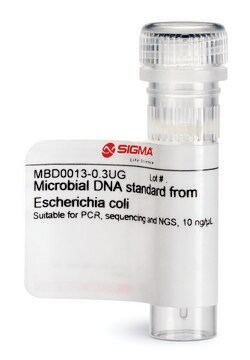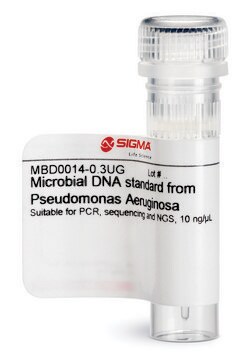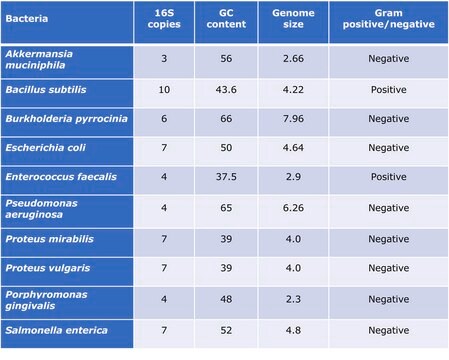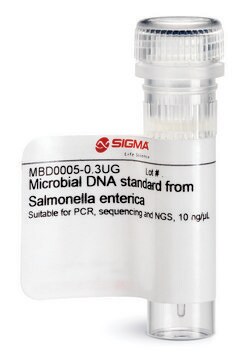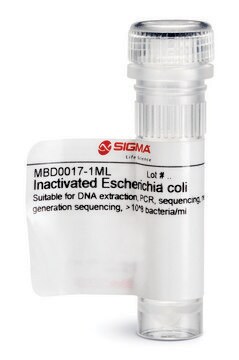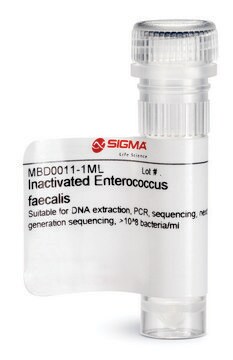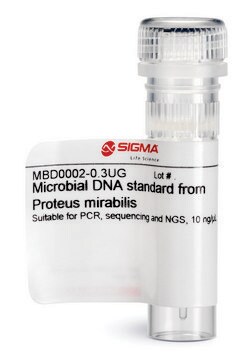MBD0012
Microbial DNA standard from Enterococcus faecalis
Suitable for PCR, sequencing and NGS, 10 ng/μL
Autenticatiper visualizzare i prezzi riservati alla tua organizzazione & contrattuali
About This Item
Codice UNSPSC:
41105500
NACRES:
NA.24
Prodotti consigliati
Livello qualitativo
Forma fisica
liquid
Concentrazione
10 ng/μL
tecniche
DNA extraction: suitable
DNA sequencing: suitable
PCR: suitable
Condizioni di spedizione
ambient
Temperatura di conservazione
−20°C
Descrizione generale
Standardization of sample analysis is currently needed in microbiome genomics research workflow. Lack of standardization can lead to biases and errors in common processes during sample preparation and analysis such as sample amplification, sequencing and bioinformatics analyses. Enterococcus faecalis genomic DNA microbial standard can serve as standard for benchmarking the performance along the workflow of microbiomics or meta-genomics analyses and as a tool to increase reproducibility and allow comparison of results obtained by different labs. Enterococcus faecalis is a gram positive, facultative anaerobic, non-motile, coci-shaped bacterium. It is a commensal bacterium of the human intestine and a major opportunistic pathogen in immunocompromised and elderly patients. The pathogenesis of E. faecalis infection relies in part on its capacity to colonize the gut. Following disruption of intestinal homeostasis, E. faecalis can overgrow, cross the intestinal barrier, and enter the lymph and bloodstream. Isolates of E. faecalis that have ended up in strain collections, mainly from clinical infection sources, appear to have acquired resistance to tetracycline and chloramphenicol in the 1950s and 1960s, followed by gentamicin and erythromycin resistance in the 1970s, then ampicillin and vancomycin resistance in the 1980s and 1990s.
Read here how to use our standards to ensure data integrity for your microbiome research.
Read here how to use our standards to ensure data integrity for your microbiome research.
Applicazioni
The genomic DNA is provided at >=10 ng/μL concentration in TE buffer pH 8.0. It is recommended to avoid freeze thaw cycles of this product.
Suitable for Quantitative standard for PCR, Sequencing and NGS
Suitable for Quantitative standard for PCR, Sequencing and NGS
Caratteristiche e vantaggi
- Individual microbial standard for microbiomics and meta-genomics workflow
- Suitable standard for PCR, sequencing and NGS
- Improve Bioinformatics analyses
- Increases reproducibility
- Compare results lab to lab
Stato fisico
Liquid -The genomic DNA is provided at >=10 ng/μL concentration in TE buffer pH 8.0
Codice della classe di stoccaggio
12 - Non Combustible Liquids
Classe di pericolosità dell'acqua (WGK)
WGK 1
Punto d’infiammabilità (°F)
Not applicable
Punto d’infiammabilità (°C)
Not applicable
Certificati d'analisi (COA)
Cerca il Certificati d'analisi (COA) digitando il numero di lotto/batch corrispondente. I numeri di lotto o di batch sono stampati sull'etichetta dei prodotti dopo la parola ‘Lotto’ o ‘Batch’.
Possiedi già questo prodotto?
I documenti relativi ai prodotti acquistati recentemente sono disponibili nell’Archivio dei documenti.
Daria Van Tyne et al.
Annual review of microbiology, 68, 337-356 (2014-07-09)
The enterococci are an ancient genus that evolved along with the tree of life. These intrinsically rugged bacteria are highly adapted members of the intestinal consortia of a range of hosts that spans the animal kingdom. Enterococci are also leading
B E Murray
Clinical microbiology reviews, 3(1), 46-65 (1990-01-01)
Enterococci are important human pathogens that are increasingly resistant to antimicrobial agents. These organisms were previously considered part of the genus Streptococcus but have recently been reclassified into their own genus, called Enterococcus. To date, 12 species pathogenic for humans
J Paul Brooks et al.
BMC microbiology, 15, 66-66 (2015-04-17)
Characterizing microbial communities via next-generation sequencing is subject to a number of pitfalls involving sample processing. The observed community composition can be a severe distortion of the quantities of bacteria actually present in the microbiome, hampering analysis and threatening the
Lionel Rigottier-Gois et al.
The Journal of infectious diseases, 211(1), 62-71 (2014-07-19)
Enterococcus faecalis is a commensal bacterium of the human intestine and a major opportunistic pathogen in immunocompromised and elderly patients. The pathogenesis of E. faecalis infection relies in part on its capacity to colonize the gut. Following disruption of intestinal
Il team dei nostri ricercatori vanta grande esperienza in tutte le aree della ricerca quali Life Science, scienza dei materiali, sintesi chimica, cromatografia, discipline analitiche, ecc..
Contatta l'Assistenza Tecnica.